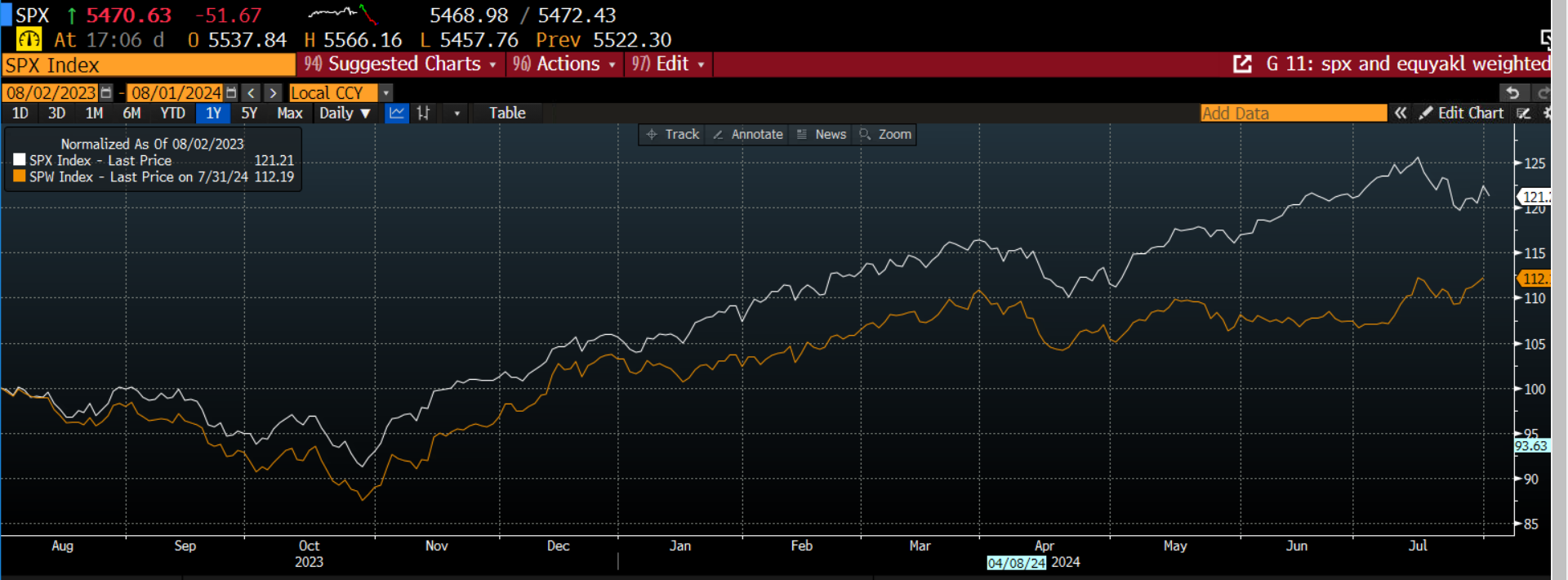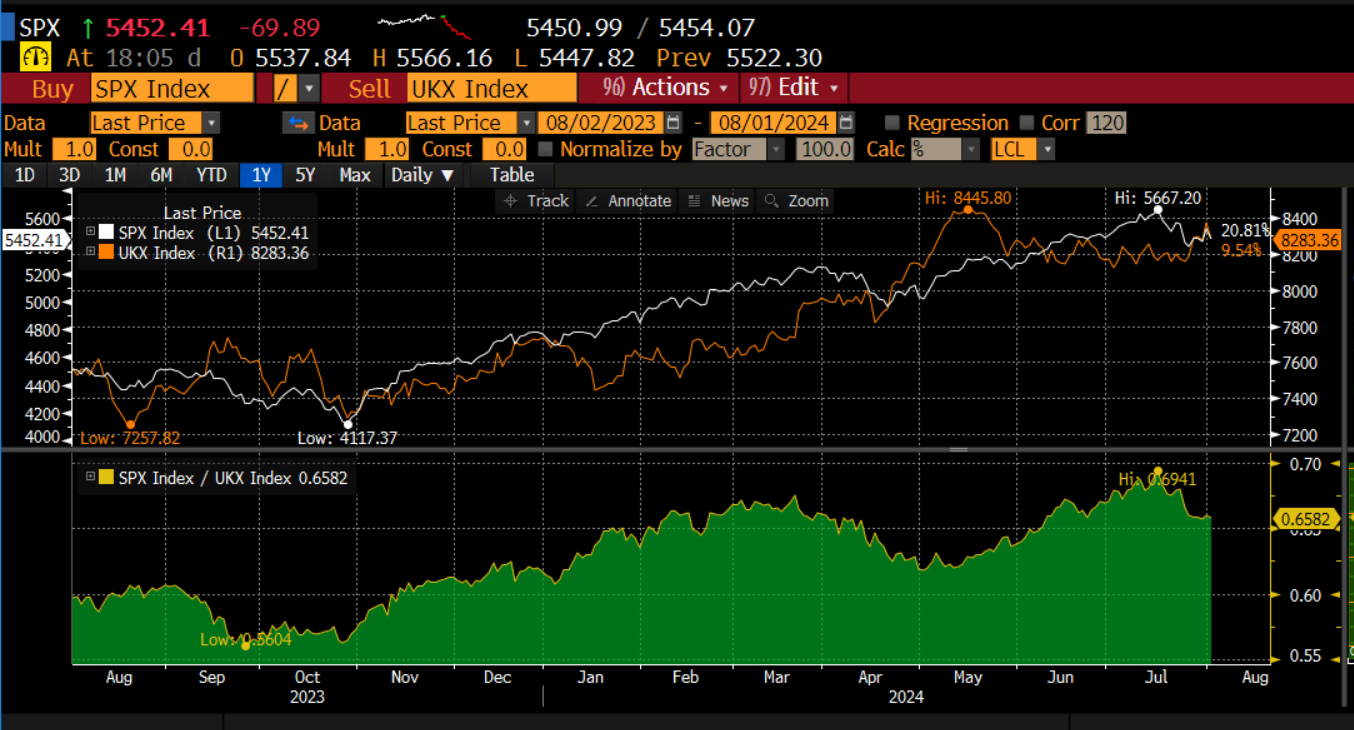The first half of 2024 will be remembered for strong gains in stock markets, particularly in the mega caps stocks in the US and Japanese equities. Smaller cap stocks and European equities trailed these gains, however, there could be a chance for them to play catch up. The start of the year was dominated by the chip makers and US stocks, especially the tech stocks. The Nasdaq was one of the top performing stock indices globally, rallying more than 16% from January through to the end of July. Japanese stock indices were also top performers, the Nikkei is higher by more 13% than while the Topix is higher by 14%, as investor interest in Japan was piqued by the prospect of interest rate normalisation by the Bank of Japan. As we move through Q3 a new theme could be about to take over markets.
The first half of 2024 will be remembered for strong gains in stock markets, particularly in the mega caps stocks in the US and Japanese equities. Smaller cap stocks and European equities trailed these gains, however, there could be a chance for them to play catch up. The start of the year was dominated by the chip makers and US stocks, especially the tech stocks. The Nasdaq was one of the top performing stock indices globally, rallying more than 16% from January through to the end of July. Japanese stock indices were also top performers, the Nikkei is higher by more 13% than while the Topix is higher by 14%, as investor interest in Japan was piqued by the prospect of interest rate normalisation by the Bank of Japan. As we move through Q3 a new theme could be about to take over markets.
Will the great rotation begin?
The value trade, otherwise known as the great rotation trade or the catch-up trade, has seen mid-cap stocks and value stocks play catch up with the main blue-chip indices. We do not think that investors have fallen out of love with the tech sector and the AI darlings, rather there are compelling forces that could help the value sectors of the stock market play catch up with the tech stocks. For example, compelling valuations. Exxon Mobil has a current price / earnings ratio of 13x earnings, one of the lowest on the S&P 500, this compares to Tesla, the EV maker, which has a price to earnings ratio of 115 x earnings. Exxon generates huge revenues and is a solid US company, in contrast, Tesla’s profits fell last quarter and revenue growth was weaker than expected. Exxon is not the only stock that looks ripe to play catch up with Tesla and other mega cap growth stocks. Financial stocks such as Wells Fargo, industrial stocks such as Haliburton and retail companies also have experienced low P/E ratios for some time. As growth stocks, such as chip makers like AMD, who have a P/E ratio of more than 160 x earnings, start to look expensive, investors may favour stocks with decent earnings that look cheap.
As you can see from the chart below, the S&P 500, which is a market capitalisation-weighted index, has outperformed the equal weighted S&P 500 index for most of the last year. In fact, the S&P 500 equal weighted index has only managed to gain 4/5 of the gains the S&P 500 market cap weighted index has made. Although the performance gap has narrowed as we have moved through July, the S&P 500 is still massively outperforming the equal weighted index, as you can see. However, this also means that the equal weighted index has more room to play catch up later this year.
Chart 1: S&P 500 vs. S&P 500 equal-weighted index
 Source: XTB and Bloomberg
Source: XTB and Bloomberg
Past performance is not a reliable indicator of future results.
Interest rate cuts to provide support to the rotation trade
Central banks could also support the great rotation trade. The Fed is expected to cut interest rates in September and embark on a series of further rate cuts after that. The Eurozone and the UK have already started to cut interest rates. This is another reason why the market may start to favour value stocks, since they tend to be more sensitive to monetary policy and also to the economic cycle and when interest rates are cut, this can be good news for the global economy.
Why FX matters
Another reason why companies may look to the less loved sectors of the stock market is due to the currency effect. Japanese stocks may have been in favour earlier this year, but their star has fallen in recent months due to currency implications. Although the Nikkei has risen by nearly 14% on a price return basis, when this is adjusted for the currency effect, the YTD return is halved. The yen has been exceptionally weak this year. Although it has been clawing back losses in recent weeks, USD/JPY is still lower by 6% so far this year, and the yen is also lower by 6% vs. the GBP. When you are trading global stock markets, it is worth taking account of the currency impact. The dollar has been stable this year, and the pound is the top performer in the G10 FX space so far this year, and this may boost the attractiveness of the UK blue chip index.
The FTSE 100 has virtually no tech and is considered a value-based index. More than half of the index has a P/E ratio below 20, and only one company on the index has a P/E ratio above 100. Added to this, the Bank of England started to cut interest rates in August and the political situation in the UK looks stable compared to elsewhere: France still has no government, and in the US the Presidential election has had some dramatic twists and turns. Although the S&P 500 has outperformed the FTSE 100 for many years, the FTSE 100 has started to outperform the S&P 500, as you can see. The S&P 500 / FTSE 100 ratio peaked in early July and has started to decline, although it remains at high levels, as you can see below.
Chart 2: S&P 500 and the FTSE 100 ratio
 Source: Bloomberg and XTB
Source: Bloomberg and XTB
Past performance is not a reliable indicator of future results.
Overall, there are plenty of cheap stocks on offer in the US and in Europe, particularly the UK. Value stocks have recently started to outperform US indices that are dominated by mega cap tech stocks; however, they have a lot further to go. But, if investors are looking for bargains, the great rotation trade may continue for the rest of this year.

Climate change investments: Maximising impact

What is Next for the AI Trade?

Investing during a crisis: Strategies and Tips
This content has been created by XTB S.A. This service is provided by XTB S.A., with its registered office in Warsaw, at Prosta 67, 00-838 Warsaw, Poland, entered in the register of entrepreneurs of the National Court Register (Krajowy Rejestr Sądowy) conducted by District Court for the Capital City of Warsaw, XII Commercial Division of the National Court Register under KRS number 0000217580, REGON number 015803782 and Tax Identification Number (NIP) 527-24-43-955, with the fully paid up share capital in the amount of PLN 5.869.181,75. XTB S.A. conducts brokerage activities on the basis of the license granted by Polish Securities and Exchange Commission on 8th November 2005 No. DDM-M-4021-57-1/2005 and is supervised by Polish Supervision Authority.


